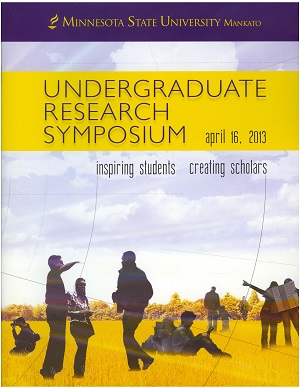The Effects of a Montessori-Based Activity on Affect and Engagement in Persons with Dementia
Location
CSU 201
Start Date
16-4-2013 11:10 AM
End Date
16-4-2013 12:10 PM
Student's Major
Psychology
Student's College
Social and Behavioral Sciences
Mentor's Name
Jeffrey Buchanan
Mentor's Department
Psychology
Mentor's College
Social and Behavioral Sciences
Description
Activities for persons with dementia can provide many benefits such as cognitive and social stimulation and reduced agitation. Montessori-based activities are designed with specific principles in mind such as building on existing skills, repetition, and making tasks that are self-correcting. The purpose of this study was to compare the effects of a Montessori-based group activity to typically-offered activities in terms of the amount of active engagement and positive affect displayed. Eight individuals diagnosed with dementia and who lived in a memory care unit participated in the study. The study used an A-B-A- B experimental design where baseline (A) involved observing activities typically offered in the facility and the intervention (B) involved participants playing a Montessori-based activity called “Memory Bingo”. Memory Bingo consists of four cards containing a picture and word linking to corresponding cards that are called out. If participants have the matching card, they flip it over. The game continues until someone flips over all their cards. During both phases, participant’s affect and engagement were recorded through direct observation. Data collection is 90% complete. Thus far, the Montessori-based activity appears to yield greater levels of active engagement compared to typically-offered activities.Positive affect, however, has remained relatively steady throughout all phases. There is a need for new activity programs that are interesting and engaging to individuals with dementia. Montessori-based activities, such as Memory Bingo, may offer a promising alternative approach to activity programming that may result in increased enjoyment and participation in activities for persons with dementia.
The Effects of a Montessori-Based Activity on Affect and Engagement in Persons with Dementia
CSU 201
Activities for persons with dementia can provide many benefits such as cognitive and social stimulation and reduced agitation. Montessori-based activities are designed with specific principles in mind such as building on existing skills, repetition, and making tasks that are self-correcting. The purpose of this study was to compare the effects of a Montessori-based group activity to typically-offered activities in terms of the amount of active engagement and positive affect displayed. Eight individuals diagnosed with dementia and who lived in a memory care unit participated in the study. The study used an A-B-A- B experimental design where baseline (A) involved observing activities typically offered in the facility and the intervention (B) involved participants playing a Montessori-based activity called “Memory Bingo”. Memory Bingo consists of four cards containing a picture and word linking to corresponding cards that are called out. If participants have the matching card, they flip it over. The game continues until someone flips over all their cards. During both phases, participant’s affect and engagement were recorded through direct observation. Data collection is 90% complete. Thus far, the Montessori-based activity appears to yield greater levels of active engagement compared to typically-offered activities.Positive affect, however, has remained relatively steady throughout all phases. There is a need for new activity programs that are interesting and engaging to individuals with dementia. Montessori-based activities, such as Memory Bingo, may offer a promising alternative approach to activity programming that may result in increased enjoyment and participation in activities for persons with dementia.
Recommended Citation
Hindt, Amber; Jill Sohre; and Jill Morris. "The Effects of a Montessori-Based Activity on Affect and Engagement in Persons with Dementia." Undergraduate Research Symposium, Mankato, MN, April 16, 2013.
https://cornerstone.lib.mnsu.edu/urs/2013/oral-session-06/2




